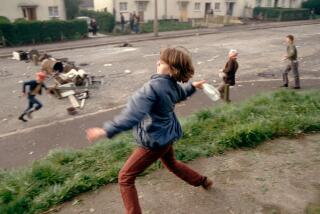British Army Moves to Match IRA
- Share via
BELFAST, Northern Ireland — The British army began closing several security posts in Northern Ireland’s rural Roman Catholic heartland Friday in a rapid response to the Irish Republican Army’s announcement that it had ended its armed struggle.
The gesture, directed at Catholics who have long demanded more demilitarization, increased pressure on the IRA to disarm quickly, as it promised in Thursday’s statement. It also fueled hope that a large British military presence would no longer be necessary.
The British government would not have responded so quickly if it did not expect the IRA to keep its promise, said Paul Dixon, professor of politics at the University of Ulster. The closings help the IRA “manage its audience,” he said.
“Republicans can immediately see that it’s not just them demilitarizing, but the British state is also demilitarizing,” Dixon said.
The army base, watchtower and police observation post being closed lie in south Armagh County, a notorious IRA stronghold along the border of the Republic of Ireland that is often referred to as “bandit country.”
About 12,000 British soldiers are stationed in Northern Ireland, down from 19,000 in 1998.
Sinn Fein, the IRA’s political ally and the dominant Catholic party, welcomed the closures.
“That’s a good commitment from the British government to speed up demilitarization,” said Pat Doherty, a member of the British Parliament. “But it must now keep moving forward.”
The IRA, which fought to unite the British-ruled province of Northern Ireland with the Irish Republic, said it was not disbanding but it would continue its struggle by peaceful and democratic means. Protestant unionists want Northern Ireland to remain British-ruled.
Demilitarizing is one of several initiatives that will be revived as an international watchdog monitors the IRA’s progress, said Peter Hain, Britain’s Northern Ireland secretary.
“In the meantime, we’ll be taking forward a process of political negotiation, engagement and normalization of policing, and withdrawal of military support for the police,” Hain told the BBC. Legislation clearing the way for fugitives to return to the province will be also introduced, he said.
The IRA, which has been observing a cease-fire since 1997, reportedly hid most of its weapons caches in the Irish Republic. According to estimates, there are hundreds of machine guns and assault rifles, dozens of rocket-propelled grenades, missiles and tons of military-grade explosives. Some weapons probably will never be found because IRA supporters who knew their locations have died, Irish police have said.
Even if every gun is not destroyed, the IRA’s promise to disarm seems genuine, said Dixon, the professor. The scorn heaped on the IRA after it was blamed for a $50-million bank robbery and the killing of a Belfast Catholic this year was so great that it strengthened the advocates of disarming, Dixon said.
“Among republicans themselves, there’s a real desire for the struggle to be remembered as a brave sacrifice and unselfish, rather than criminal,” Dixon said. “They probably thought they needed to wrap it up before it really got out of hand.”
Protestant Unionist leaders scoffed at Thursday’s IRA statement. The IRA’s failure to fully disarm after the landmark 1998 Good Friday agreement hastened the collapse of a power-sharing Protestant-Catholic government in 2002.
The hard-line Democratic Unionists, the dominant Protestant party, have vowed not to negotiate with Sinn Fein until the IRA has verifiably disarmed, no matter what kind of pressure the British government applies.
“We’re going to make sure any move forward is on firm foundations, and no amount of pressure will force us to take action before we’re ready,” said Peter Weir, a Democratic Unionist member of Ulster’s suspended assembly.
Hoping to help restart the peace process, President Bush phoned both Sinn Fein leader Gerry Adams and Democratic Unionist leader Ian Paisley on Friday.
“The president stressed the importance of the IRA’s responsibility to follow through on its words with action, and the president encouraged Dr. Paisley to give the IRA the opportunity to live up to what they said they will do,” White House Press Secretary Scott McClellan said.
The IRA statement also refocused attention on the issue of policing.
Republicans accuse the police of colluding with loyalist paramilitaries during Northern Ireland’s conflict. IRA members act as vigilantes in republican areas where Catholics don’t trust police.
A quota system has doubled the percentage of Catholic police officers over the last four years to 17%, but Sinn Fein still rejects the force.
“We do believe that any society needs police, but we also believe that what we have now isn’t good enough,” Doherty said.
The focus has turned to the question of whether loyalist paramilitaries will disarm as well, and whether they will stop fighting each other.
A bloody feud between rival loyalist militias has raged this summer, claiming two lives. A Belfast housing estate was evacuated this week after one militia surrounded it and forced out rivals.
“This has to stop,” Hain, Northern Ireland’s secretary of state, said in a statement Friday. “No longer can there be areas plagued with feuds and murders -- gangsterism masquerading as ‘loyalism.’ ”
More to Read
Sign up for Essential California
The most important California stories and recommendations in your inbox every morning.
You may occasionally receive promotional content from the Los Angeles Times.













